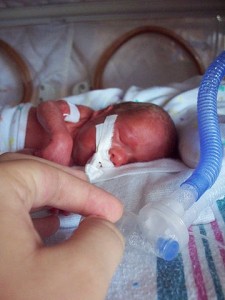A damning new report from U.S. scientists has said that premature babies are in danger from the very equipment meant to save them.
High levels of a phthalate chemical called DEHP is present in much of the equipment used in special care baby units and pediatric intensive care units.
From the BBC:
DEHP is used in the manufacture of PVC plastic and helps to make it softer and more flexible, but it can leach out of the plastic, and has been shown in the laboratory to cause reproductive birth defects and infertility in animals.
The new study suggested the amount of DEHP in medical equipment such as breathing tubes, intravenous lines and blood bags meant vulnerable babies may be in contact with levels far higher than that deemed to be safe.
Previous research that attempted to calculate exposure to DEHP in babies in hospital had measured how much was passed out in the urine, but this was difficult to do accurately, the researchers said.
Instead the team, from Johns Hopkins Bloomberg School of Public Health, calculated potential exposure based on studies that had shown how much DEHP could leak out of certain medical devices.
Reporting in the Journal of Perinatology, they estimated that premature babies who were on a ventilator could be exposed to about 16mg/kg per day, which is 4,000 to 160,000 times higher than those believed to be safe.
Analysis of the possible health impacts, other than the most commonly reported effects on reproduction showed, at least in animals, phthalates could also cause problems with the development of the lungs, gut, brain and eyes development.
Study leader Dr Eric Mallow said critically ill premature babies were cared for in an environment almost completely made of plastic.
“The role of these synthetic materials in the clinical course of our patients remains almost completely unexplored.
“PVC is the predominant flexible plastic in most NICUs [neonatal intensive care units], and this can result in considerable DEHP exposures during intensive care,” he said. (read more)
Premature babies are the most vulnerable of our children and yet they are being poisoned by the environment they are treated in.
European regulators have classified DEHP as a possible carcinogen, and they have published an in-depth report which you can read in full here.
Here’s an excerpt:
Recently, the International Agency for
Research on Cancer (IARC) indicated that there is sufficient evidence in experimental animals
for the carcinogenicity of DEHP. Thus, DEHP has been classified as possibly carcinogenic to
humans
Until further research is carried out, hospitals should be forced to change their equipment in neo-natal units.


Chemicals are killing us but let’s focus on weather! And Kim K’s butt!